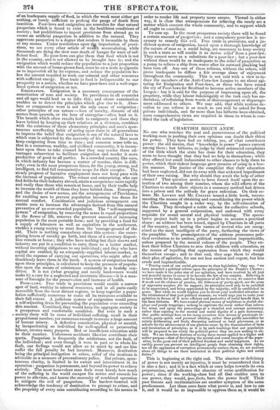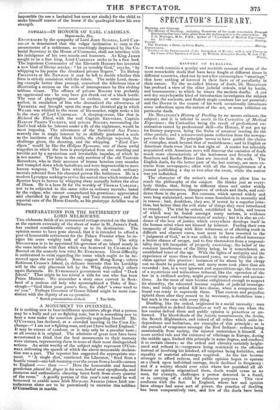CHARTISM BEGUN ANEW.
No one who watches the zeal and perseverance of the political working-men in pushing their own opinions can doubt their thirst for power. They have had an inkling, too, of what constitutes power : the old maxim, that "knowledge is power" passes current among them ; but hitherto, to judge by their reiterated complaints of the little which the state has done for their education, they seem to have thought that they had no help in themselves ; while they offered but small inducement to other classes to help them to power, which their violent language gave promise of using in a hos- tile manner. The justice of the complaint that their education had been neglected, did not do away with that awkward impediment of their own raising. But why should they await the help of other classes ? That question seems to have forced itself upon the at- tention of two among their number, whom the wild efforts of the Chartists to snatch their objects in a summary method had driven into a prison and the solitude for grave reflection. On their re- lease Mr. LOVETT and Mr. Commis issued a little book, recom- mending the means of obtaining and consolidating the power which the Chartists sought in a ruder way, by the self-education of the class. They developed a noble scheme for collective schools, supported by a general cooperation, and endowed with every requisite for sound mental and physical training. The specu- lative project built up in a prison begins to assume a practical shape : an address has been issued, signed by Chartists in all parts of the country, and bearing the names of several who are recog- nized as the most intelligent of the party, furthering the views of the pamphlet. The promulgators of the address pronounce poli- tical revolution to be useless, • political regeneration impracticable, unless prepared by the mental culture of the people. They ex- hort their fellow Chartists to arm their children with education, as the means of repelling that oppression from which they would themselves escape ; and to that end, they urge them to change their plan of agitation, for one not less earnest and cogent, but less crude and impracticable.
"Tracing most of our social grievances to class legislation," they say, "we have proposed a political reform upon the principles of the People ta Charter : we have made it the polar star of our agitation, and have resolved by all just and peaceful means to cause it to become the la* of our country. Believing it to have truth for its basis, and the happiness of all for its end, we conceive that it needs not the violence of passion, the bitterness of party-spirit, nor the arms of aggressive warfare for its support; its principles need only to be unfolded to be appreciated, and being appreciated by the majority, will be established in peace. But while we would implore you to direct your undivided attention to the attainment of that just political measure, we would urge you to make your agitation in favour of it more efficient and productive of social benefit than it has been hitherto. We have wasted glorious means of usefulness in foolish dis- plays and gaudy trappings ; seeking to captivate the sense rather than inform the mind, and aping the proceedings of a tinselled and corrupt aristocracy rather than aspiring to the mental and moral dignity of a pure democracy. Our public meetings have on too many occasions been arenas Of passionate in- vective, party-spirit, and personal idolatry, rather than public assemblies for calmly deliberating and freely discussing national or local grievances, or as schools for the advancement of our glorious cause by the dissemination of facts and inculcation of principles; as it is by such teachings that our population will be prepared to use wisely the political power they are now seeking to ob- tain. We are therefore desirous of seeing these means applied to a higher and nobler purpose—that of developing the mental and moral energies of the popn- ation, to the great end of their political freedom and social happiness.. fts no earthly power can prevent an intelligent people from obtaining their rights, nor all the appliances of corruption permanently enslave them, we are anxious above all things to see them instructed in their political rights and social. duties."
This is beginning at the right end. The absence or deficiency of power is not merely an injustice, it must be remembered that it is also a fact ; and it is a fact which at once helps towards its own perpetuation, and indicates the absence of some qualification for power ; since if the working-class had all that enables men to use power, they Would, ipso facto, have the power itself. Their past threats and recriminations are another symptom of the same predicament. Let them once know what power is, and how to use it, and it would be as impossible to oppress them as. it would be
impoisible (to use a hacknied but most apt simile) for the child to make himself master of the horse if the quadruped knew his own strength.



























 Previous page
Previous page